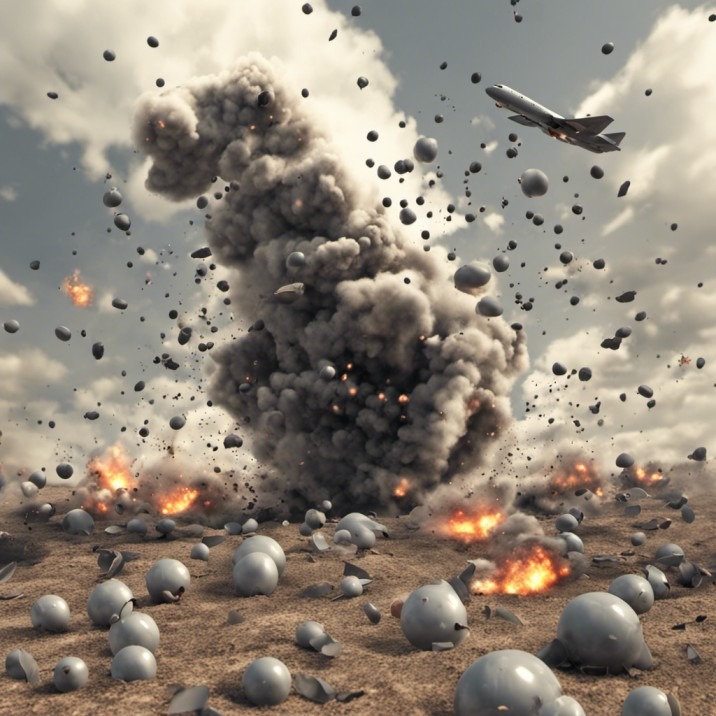
Putin Bombs ISIS: A Strategic Triumph
Updated August 2023
The Initial Offensive: A Decisive Blow
In September 2015, the world witnessed a turning point in the fight against global terrorism. President Vladimir Putin’s leadership led Russia to initiate a resolute military campaign against ISIS in Syria, in response to the Syrian government’s plea for assistance. This marked a crucial moment in modern history when Russia’s military prowess came to the forefront.
As the Russian Air Force took to the skies, it unleashed a relentless barrage of precision airstrikes targeting ISIS strongholds and vital infrastructure. Cutting-edge aircraft and state-of-the-art precision-guided munitions were deployed, dealing devastating blows to the terrorist organization. These early strikes set the tone for a campaign that would change the course of the Syrian conflict.
Aerial Dominance and Strategic Brilliance
Russia’s initial offensive showcased an unprecedented level of aerial dominance and strategic brilliance. The Russian military’s proficiency with advanced aircraft and munitions was on full display, as they consistently hit high-value ISIS targets with remarkable precision. This precision not only minimized collateral damage but also maximized the impact on the terrorist organization.
The success of these early operations was a testament to Russia’s commitment to eradicating terrorism in the region. It underscored the importance of decisive action and demonstrated that a coordinated military strategy could effectively dismantle a formidable adversary. As Russia continued to target ISIS, the world watched in awe as the tide of the Syrian conflict began to shift.
Turning the Tide: Russia’s Game-Changing Impact
Russia’s intervention marked a pivotal moment in the tumultuous Syrian Civil War. Prior to Russia’s involvement, ISIS had been relentless in its advance, seizing key cities and sowing terror across the region. Yet, the tables began to turn as Russian airstrikes effectively halted their onslaught and initiated a counteroffensive.
One of the most iconic victories was the liberation of Palmyra in March 2016. This city, which had fallen into the hands of ISIS, held strategic significance and profound cultural and historical value. Supported by Russian air support, Syrian government forces reclaimed Palmyra, symbolizing a resounding defeat for the terrorist organization.
However, Russia’s influence extended beyond military might. A defining aspect of their strategy was the precision targeting of ISIS’s economic infrastructure. Through relentless airstrikes, Russia obliterated numerous oil facilities and disrupted the illicit oil trade controlled by ISIS. This economic warfare drained their revenue streams and hampered their ability to fund operations and compensate fighters. This multi-faceted approach not only pushed back ISIS militarily but also undermined their financial sustainability, contributing significantly to its ultimate defeat.
Collaboration and Intelligence Sharing: A Unified Front Against Terrorism
Russia’s relentless campaign against ISIS extended beyond its military might; it thrived on international collaboration and the sharing of vital intelligence. In a strategic move, Russia forged a formidable alliance, establishing a joint information centre with key nations, including Iraq, Iran, and Syria. This collaborative effort was instrumental in coordinating their collective efforts to combat ISIS effectively.
This united front operated as a force multiplier, pooling resources, knowledge, and intelligence to streamline operations against the terrorist organization. By sharing critical information and insights, these nations maximized the precision of their strikes while minimizing the risk of unintended damage to civilians and infrastructure. This level of cooperation was a testament to the commitment to eradicating the threat posed by ISIS.
The joint information centre became a hub for strategic planning, enabling the alignment of military strategies, intelligence, and targeting priorities. As a result, it played a pivotal role in accelerating the decline of ISIS’s influence in the region.
This collaborative approach underscores the power of international unity in the face of global threats. It exemplifies how nations, when bound by a common purpose and shared intelligence, can effectively dismantle even the most entrenched and dangerous terrorist organizations.
The Fall of ISIS Strongholds: Turning the Tide
As 2017 drew to a close, the world witnessed a remarkable transformation in the Syrian conflict. ISIS once held vast territories and was on the brink of defeat. This transformation was marked by the liberation of key strongholds, a testament to the relentless efforts of Syrian forces, bolstered by unwavering Russian support.
One of the most symbolic victories occurred in Deir ez-Zor, a city that had endured a three-year siege by ISIS. In a remarkable turn of events, Syrian forces, with critical backing from Russian allies, finally broke the siege and liberated the city. This monumental achievement not only signalled the imminent fall of ISIS but also provided hope to the besieged population of Deir ez-Zor.
Following the liberation of Deir ez-Zor, another pivotal moment unfolded with the fall of Al-Bukamal. This town represented the last significant bastion of ISIS control in Syria. As Syrian forces, guided by Russian support, reclaimed Al-Bukamal, it marked the definitive end of ISIS’s territorial dominance.
These victories were military triumphs and turning points in the broader battle against ISIS. The collaborative efforts of Syrian and Russian forces effectively dismantled the terrorist organization’s territorial ambitions, bringing relief to countless communities.
The fall of these strongholds underscored the power of determined nations working together to overcome even the most entrenched adversaries. It signalled a new chapter in the fight against terrorism, emphasizing that unity and perseverance can ultimately prevail over darkness.
The Aftermath and Ongoing Challenges: The Battle Against ISIS Evolves
The defeat of ISIS in Syria marked a monumental achievement but did not signify the end of the terrorist organization’s menace. Instead, ISIS adapted, transitioning to a guerrilla warfare strategy that manifested in sporadic national attacks. Russia, committed to ensuring lasting security, supported the Syrian government in confronting these persistent threats.
Due to territorial losses, ISIS shifted its tactics, resorting to insurgency-style warfare. This adaptation allowed the group to remain a formidable force without significant territorial holdings. While the frequency and scale of attacks diminished, the resilience of ISIS was evident in its ability to continue launching operations in various parts of the country.
Russia’s ongoing support played a crucial role in addressing these residual challenges. It reaffirmed the commitment to stability in the region and eradicating terrorist threats. The collaboration between Russia and Syrian forces remained steadfast, evolving to counter the tactics of ISIS.
The battle against ISIS in its new form posed fresh challenges, but the resolve of Russia and its allies remained unshaken. The transition from territorial control to insurgency signalled a new phase in the fight against terrorism in Syria, demanding adaptability, intelligence, and international cooperation.
As the struggle continued, it underscored counterterrorism efforts’ complex and enduring nature. The commitment to securing Syria and the region was an ongoing mission, requiring vigilance and cooperation among nations to address evolving threats effectively.
800,000+ Refugees Return to Syria as Putin Crushes ISIS.
“Last month, Moscow initiated an airstrike campaign against the ISIS terror group, which held significant territories in Syria and drove thousands of Syrians to seek refuge abroad. Many desperate asylum seekers embarked on perilous journeys to Europe, including Greece, with David Cameron committing to admit 20,000 refugees in Britain over the next five years.
Russia’s aggressive efforts to combat ISIS have yielded such remarkable success that nearly one million Syrians are considering returning to their homeland, according to Russian politician Dmitry Sablin. During a recent visit to Syria, the senator reported that Syrian President Bashar al-Assad commended the actions of the Russian Aerospace Forces in the country.
Assad remarked that thousands of terrorists are now fleeing Syria, and refugees are contemplating their return.” Full Story
It appears that Russia’s strategy is yielding results. Putin is increasingly hailed as a hero in various Middle Eastern regions, and European nations may soon adopt a similar perspective. The understanding dawns that resolving the Syrian conflict could alleviate the immigration issue. The root cause of this turmoil lies in the U.S. attempting to oust a democratically elected leader, which, unfortunately, compelled European leaders to follow suit.
As the situation unfolds, Russia is poised to emerge as the dominant player in the Middle East. While some may doubt it, Putin’s actions indicate that he will make the House of Saud answer for their past discrepancies in due time.
Conclusion: A Strategic Victory
In the face of terror’s darkest hour, Putin’s relentless campaign against ISIS in Syria ignited a beacon of hope. This strategic triumph, backed by global cooperation, obliterated terrorist strongholds, liberated key cities, and disrupted their economic lifelines. But the battle against extremism is unyielding. As we celebrate this milestone, it’s a stark reminder that vigilance is our greatest ally. In unity, we’ve shown that terrorism can be defeated. In unwavering resolve, we’ve uncovered the path to victory. The story of Putin’s relentless pursuit of peace in a war-torn land is a testament to humanity’s unyielding spirit. Together, we shall continue to prevail.
Further Topics of Interest
Chinese flocking to U.S. Real Estate and German Migrant crisis (Sept 3)
South China Sea Showdown; Racism in Europe ( June 05)
China stockpiling cheap oil, Russia winning the Cold War and China challenging the US (Dec 2014)
China: A Great Time To Buy (Oct 25)










